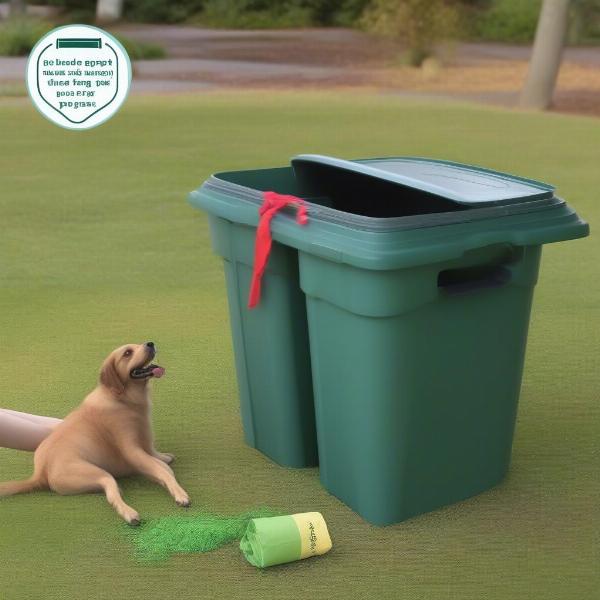Dog poop waste bins are essential for maintaining a clean and healthy environment for everyone, especially in areas frequented by dog walkers. Choosing the right bin and understanding how to use it properly is key to maximizing its effectiveness. This guide will explore everything you need to know about dog poop waste bins, from selecting the right one for your needs to ensuring its proper maintenance.
Choosing the Right Dog Poop Waste Bin
Several factors come into play when selecting the perfect dog poop waste bin:
- Size and Capacity: Consider the number of dogs in your area and the frequency of use. A larger bin is ideal for high-traffic areas, while a smaller one may suffice for residential use.
- Material: Durable materials like metal or heavy-duty plastic are preferable for their resistance to weathering and wear and tear.
- Mounting: Wall-mounted bins save space, while free-standing bins offer flexibility in placement.
- Dispenser: A built-in bag dispenser encourages responsible pet ownership and makes clean-up easier for dog walkers.
- Ease of Emptying: Choose a bin that is easy to empty and clean to ensure hygienic maintenance.
Proper Use and Maintenance of Dog Poop Waste Bins
 Using and maintaining a dog poop waste bin
Using and maintaining a dog poop waste bin
Using and maintaining dog poop waste bins correctly is crucial for their effectiveness:
- Always Use Dog Waste Bags: Never dispose of dog poop directly into the bin without bagging it first. This helps control odor and prevents the spread of diseases.
- Tie Bags Securely: Ensure the bag is tightly tied to prevent leakage and unpleasant smells.
- Dispose of Bags Properly: Don’t overfill the bin. Empty it regularly, following local waste disposal guidelines.
- Regular Cleaning: Clean the bin periodically with a disinfectant to eliminate bacteria and odors.
- Replenish Bags: Keep the dispenser stocked with dog waste bags to encourage responsible disposal.
The Importance of Dog Poop Waste Bins for Public Health
Dog waste can contain harmful bacteria and parasites that pose a risk to both human and animal health. Proper disposal through designated dog poop waste bins helps mitigate these risks.
- Prevents Disease Transmission: Dog poop can harbor parasites like roundworms and hookworms, which can be transmitted to humans and other animals.
- Reduces Environmental Contamination: Rainwater can wash dog waste into waterways, polluting water sources and harming aquatic life.
- Minimizes Unpleasant Odors: Proper disposal in sealed bins helps control unpleasant odors, making public spaces more enjoyable for everyone.
“Regularly cleaning dog poop waste bins is essential not only for aesthetic reasons but also to prevent the spread of diseases,” says Dr. Emily Carter, DVM. “This simple act can significantly contribute to public health.”
Encouraging Responsible Pet Ownership
The presence of readily available dog poop waste bins encourages responsible pet ownership.
- Community Involvement: Educating the community about the importance of proper dog waste disposal can create a cleaner environment for everyone.
- Signage and Public Awareness Campaigns: Clear signage and public awareness campaigns can remind dog owners of their responsibility to clean up after their pets.
- Positive Reinforcement: Recognizing and rewarding responsible pet owners can further promote positive behavior.
“Providing convenient and accessible dog poop waste bins is a key step in promoting responsible pet ownership,” adds Dr. Carter. “It empowers dog owners to do the right thing and contribute to a healthier community.”
Conclusion
Dog poop waste bins play a vital role in maintaining clean and healthy communities. Choosing the right bin, using it properly, and encouraging responsible pet ownership are essential steps in ensuring their effectiveness. By working together, we can create a more pleasant environment for both people and their furry companions.
FAQs
- How often should dog poop waste bins be emptied? Ideally, they should be emptied at least once or twice a week, depending on usage.
- What should I do if a dog poop waste bin is full? Report it to the relevant local authority or property management.
- What are the health risks associated with dog poop? Dog poop can contain parasites and bacteria that can cause illnesses in humans and animals.
- Why are dog waste bags important? They prevent the spread of disease and make disposal more hygienic.
- How can I encourage others to use dog poop waste bins? Lead by example and politely remind others of the importance of responsible pet ownership.
About ILM Dog
ILM Dog is your trusted resource for all things dog-related. We provide expert advice on dog breeds, health, training, nutrition, grooming, and much more. Whether you are a new dog owner or a seasoned expert, ILM Dog offers valuable insights and practical tips to help you provide the best possible care for your canine companion. Contact us today for all your dog-related queries. Email: [email protected] Phone: +44 20-3965-8624.